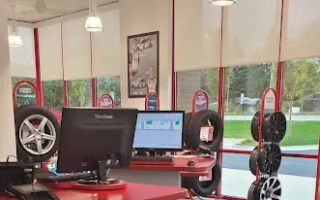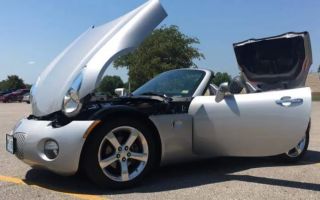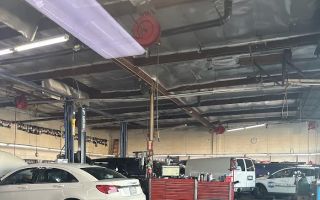Preventing Electrical Failures in Your Car: Essential Tips for Smooth Driving
When you’re driving down the road, the last thing you want is for your car to suddenly shut down due to electrical failure. As a car owner, I’ve learned that preventing electrical issues is essential to ensuring my vehicle runs smoothly. Electrical failures can stem from a variety of problems, from a dead battery to malfunctioning alternators and wiring issues. Over the years, I’ve gathered valuable knowledge on how to avoid these issues, and in this article, I’m excited to share what I’ve learned with you. Let’s explore how you can prevent electrical failures in your car, so you don’t get stuck on the side of the road at the worst possible moment.

Pick Your Part - Help Yourself
1232 Blinn Ave, Wilmington, CA 90744, USA
1. Understanding Common Electrical Failures in Cars
Electrical systems in cars are more complicated than many of us realize. They control everything from the ignition system to the power windows, radio, and lights. When something goes wrong with these components, it can lead to a range of issues, and in some cases, a complete breakdown of the car. Understanding the most common electrical failures can help you identify potential issues early before they lead to serious problems.
Dead Battery: One of the most common electrical failures in cars is a dead battery. This happens when the battery loses its charge and is unable to power the vehicle. It can happen for a variety of reasons, including a faulty alternator, leaving the lights on too long, or simply the battery reaching the end of its lifespan.
Faulty Alternator: The alternator is responsible for charging your car’s battery while the engine is running. If the alternator fails, your battery won’t get charged, and you could find yourself stranded with a car that won’t start. A malfunctioning alternator is often one of the main causes of electrical failure.
Wiring Issues: Over time, the wires and connectors in your car can become damaged or corroded, leading to electrical problems. If there is a short circuit or an open circuit, you might experience intermittent power loss or complete failure of certain electrical systems.
Blown Fuses: Fuses are designed to protect your electrical system from overloading. When a fuse blows, it cuts off power to certain components of your car. While a blown fuse is usually a simple fix, it’s important to figure out why the fuse blew in the first place, as it may indicate a deeper electrical issue.

Pick Your Part - Greer
13054 E Wade Hampton Blvd, Greer, SC 29651, USA
2. Preventative Measures: How to Keep Your Car’s Electrical System in Top Condition
Preventing electrical failures begins with proactive care. I’ve found that by following a few simple steps, you can avoid most common electrical problems and keep your car running smoothly. Below are some of the key preventative measures I take to ensure my vehicle’s electrical system stays in good working condition.
1. Regular Battery Maintenance: The battery is at the heart of your car’s electrical system, so it’s essential to keep it in top shape. I make sure to clean the battery terminals regularly to prevent corrosion, as buildup on the terminals can cause poor connections. Additionally, I check the battery’s charge level to ensure it’s functioning properly. If your battery is older than three to five years, it might be a good idea to replace it before it starts to fail unexpectedly.
2. Check the Alternator: The alternator is responsible for keeping your battery charged while driving. I recommend getting the alternator checked regularly during routine maintenance visits to ensure it’s working efficiently. If you notice that your car’s headlights are dimming while idling or that the dashboard warning light is on, these could be signs that your alternator is failing. Addressing the issue early can prevent a complete electrical failure later.
3. Inspect the Wiring: Over time, the wiring in your car can become worn or corroded, especially in areas that are exposed to moisture or extreme temperatures. I make sure to inspect the wiring and connectors, especially around the engine and under the dashboard. If any wires appear damaged, they should be repaired or replaced before they cause more serious issues.
4. Replace Blown Fuses: A blown fuse is often a sign that there is an electrical problem in your car. If a fuse blows, I replace it promptly with a new one of the same rating. If the new fuse blows again, it’s a sign that there’s an underlying issue with the electrical system, and further investigation is needed.
3. Real-Life Story: How I Prevented an Electrical Failure on a Road Trip
Let me share a personal experience that really drove home the importance of taking care of my car’s electrical system. A few summers ago, my family and I went on a road trip across the country. As we were cruising along, everything seemed perfect. The sun was shining, the kids were excited, and the radio was playing our favorite tunes. But suddenly, we noticed the headlights flickering, and the dashboard warning light flashed on. My heart sank – I knew something was wrong with the electrical system.
Thankfully, I had kept up with regular maintenance and had recently checked the battery and alternator. I pulled over to a rest stop and checked the battery terminals. Sure enough, there was some corrosion on one of the terminals. I cleaned it off and reconnected the battery. The car started right up, and the electrical system seemed to be back to normal. Without that preventative maintenance, we could have been stuck in the middle of nowhere, waiting for a tow truck. It was a perfect reminder of why I always take the time to keep my car’s electrical system in good condition.
4. When to Seek Professional Help
While regular maintenance can prevent many electrical failures, there are times when it’s best to seek professional help. If you experience persistent issues with your car’s electrical system, such as frequent blown fuses, flickering lights, or an inability to start the engine, it’s time to have a professional inspect the system. A qualified mechanic can identify the root cause of the problem and make necessary repairs before it leads to a full breakdown.
If you’re not sure where to start, you can always reach out to a trusted towing company like [Rescue & Towing]. They can recommend mechanics who specialize in electrical systems, and some services even offer roadside assistance to help with emergencies while you’re on the road.
By following these simple tips and keeping an eye on your car’s electrical system, you can prevent many common issues and enjoy a safer, more reliable driving experience. Regular maintenance and quick action when problems arise can save you from expensive repairs and unexpected breakdowns.





























